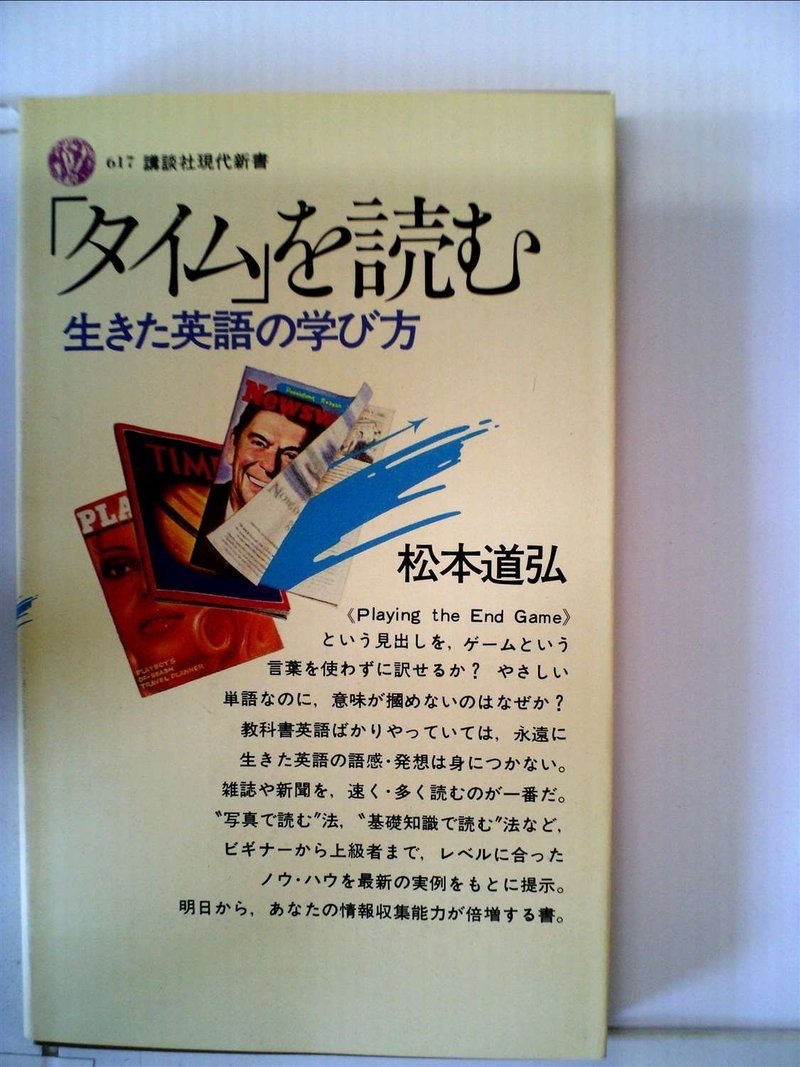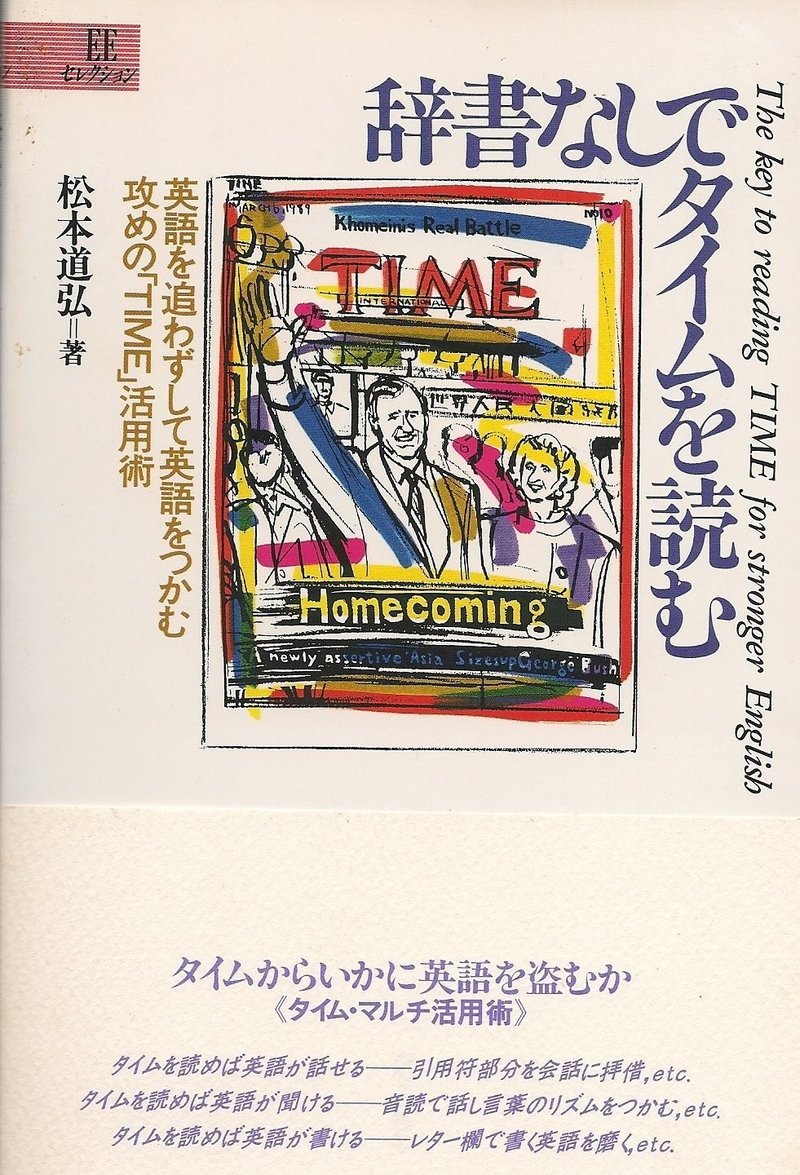
私が影響を受けた英語の達人
9月15日の投稿「私はこうして翻訳者になりました」で、私は中学生の頃から翻訳や通訳の世界に憧れを抱いていたと書きましたが、大学時代にある英語の達人に大きな影響を受けました。それは、元同時通訳者の松本道弘さんです。
松本道弘さんの衝撃
松本道弘さんについて初めて知ったのは、大学一年生の時でした。たまたま本屋で松本道弘さんの本を見つけ、買って読んだところ、その内容のレベルの高さと的を射た英語論に度肝を抜かれました。そのとき買ったのは、『「タイム」を読む』(講談社現代新書)でした。

GiveとGetは英語の心
この経験以降、本屋で松本道弘さんの本を見つけると、必ず買うようになり、端から貪り読みました。松本道弘さんの主張の中で特に驚いたのは、「giveとgetは英語の心だ」という着眼点でした。この実に単純な基本動詞が、英語の本質を形作っているという考え方は、当時の私にとっては目から鱗でした。この二つの基本動詞を使いこなすことができれば、自由自在に英語を操ることができ、逆に使い出したら癖になってしまう代物なのです。


この動詞を巧みに使いこなすためには、「発想の転換」が必要です。例えば、The latest issue of TIME gives the issue a cover story.なんていう英文を訳そうとしたら、多くの日本人は戸惑ってしまうと思います。というのも、この文にあるようなgiveという動詞の使い方になじみがないからです。大半の日本人にとって、giveという動詞は、「人が物質的に具体的な何かを与える」という意味の単語という認識があり、この文のように無生物主語を受けて使われるという認識が薄いと思います。直訳すると、「雑誌『タイム』の最新号は、その問題にカバーストーリーを与えている」となり、これでは何を言わんとしているのかよくわかりません。もう少し噛み砕いていくと、「雑誌『タイム』の最新号は、その問題にカバーストーリーの誌面を与えている」となり、正確な意味に近づいてきます。そうです、つまり、この英文の意味は、「雑誌『タイム』の最新号で、その問題が特集記事(カバーストーリー)として大きく報じられている」ということになるのです。
Give・Get仮説の証明
私は、上記の英文を松本道弘さんの本で初めて見た時、すぐに意味をつかむことはできませんでした。直訳を基にしてしばらく考えた後、ようやく意味を理解することができました。究極の基本動詞であるgiveとgetについて、松本道弘さんは『上級をめざす英会話』(講談社現代新書)の124ページから126ページで、次のように書いています。
次の英文は私(松本道弘さん)が英語道初段の頃に書き上げたもので、わざとgiveとgetという基本動詞を多用し、英語はgiveとget(take)から成り立つという私の仮説を証明したものである。
giveとgetのリズムを学びたい方は、何度も音読して頂きたい。
J: So let me give you my scenario. First, you are going to get some “Sokaiya.” Now let me get the definition straight with you. “Sokaiya” are professional gadflies hired by companies to see that there’s nobody unhappy with corporate figures they give out to the stockholders at the stockholders’ meeting, often by heckling or downright violence. They are, in short, “unlicensed business consultants with wits and guts.” Then, get them to get access to a big-name company and get all the secrets and financing gimmicks out to me. Get the company by the tail by reasoning, not by threats. Don’t threaten them to give their secrets a full airing.
Second, I’m going to get a bank guarantee from a Stateside bank to get long-term financing in Japan and to get a controlling share and controlling voice of a Japanese company to buy it out. Give the MITI high officials assurances that we’re ready to help the Japanese government get down surpluses by getting into a 50-50 joint venture with them—giving neither side control. And get their go-ahead.
Third, get big publicity and the favorable response from the consumers.
Fourth, get accounts and short-term credit from commercial banks.
Fifth, get aggressive and frustrated guys from trading companies.
Sixth, get one of the biggest supermarkets under control. And give the distribution industry in Japan some competition and get hold of it.
Seventh, after getting consumers’ moral support, get the government of Japan to give us some tax breaks or at least benign neglect, I mean, tacit approval to our aggressive business deals.
Eighth, get on with the business while we are giving the government something else to worry about. The name of the game is to get the law to get around the law.
After all, any law is made to give something to everybody. I know there’s lots of “give” in Japanese laws.
K: Are you going to get the loan first?
J: Sure. Give me credit for the word. The word is getting around in the States that my name gives marine sergeants pause in a bar. The bank who gives its clients merger and acquisition service always gives me a free hand as to how I should get the things off the ground. They will surely get the taste of big money and want to get a piece of the action, the minute we get off to a good start.
K: What if they turn it down?
J: If anybody gets in our way he’ll get it—getting what he deserves. I believe in getting a good mix of legal and illegal businesses to get the whole thing rolling. The only thing that gets on my nerves is the way government officials always give me the bureaucratic runaround. But don’t worry. My friend in court will get it straight. No problem. Got any comments? If so, get them off your chest.
K: I don’t think so. I think I got the message.

giveとgetの連続で書かれた上記の英文は、まさに英語の本質をえぐり出した達意の英文群と言えます。ここまで巧みにgiveとgetを意図的に多用して「giveとgetは英語の心だ」という自らの着想・仮説を証明した松本道弘さんの英語センスに惚れ惚れします。
この記事が気に入ったらサポートをしてみませんか?
